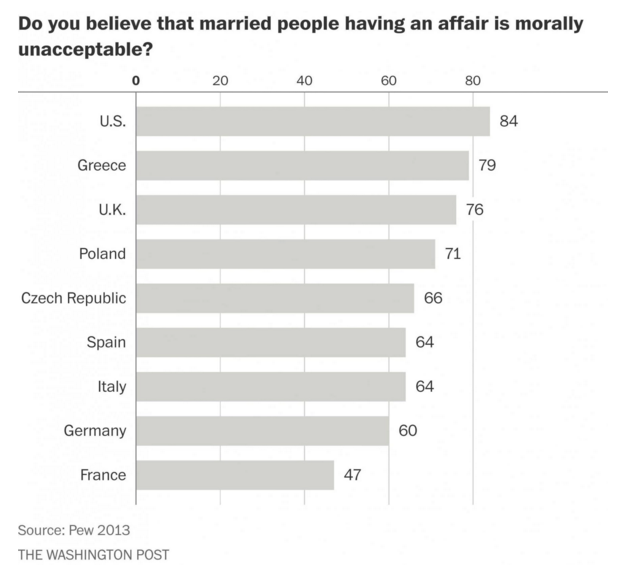Americans condemn adultery, but many Europeans don’t — and probably never will

Your support helps us to tell the story
From reproductive rights to climate change to Big Tech, The Independent is on the ground when the story is developing. Whether it's investigating the financials of Elon Musk's pro-Trump PAC or producing our latest documentary, 'The A Word', which shines a light on the American women fighting for reproductive rights, we know how important it is to parse out the facts from the messaging.
At such a critical moment in US history, we need reporters on the ground. Your donation allows us to keep sending journalists to speak to both sides of the story.
The Independent is trusted by Americans across the entire political spectrum. And unlike many other quality news outlets, we choose not to lock Americans out of our reporting and analysis with paywalls. We believe quality journalism should be available to everyone, paid for by those who can afford it.
Your support makes all the difference.In some regards, Americans and Europeans could not be more different. Germans are known for their nudist beaches, which will be crowded in the coming months, for instance. In the United States, nudity is less welcome, to say the least. Nearly all Europeans are also okay with premarital sex, but every third American thinks it is unacceptable.
And then there's a big one: adultery.
While 84 percent of Americans surveyed believe that adultery is unacceptable, only 47 percent of all French and 60 percent of all Germans think so. The Pew Research survey from 2013 also included other European nations, including Italy, Spain and the Czech Republic, where acceptance of adultery was also higher than in the United States.
Why are the differences so significant?

"I think it comes down to the puritanical history of the United States," said JoAnne Sweeny, an associate professor of law at the University of Louisville. "Early Colonial laws specifically noted that adultery was in violation of the Ten Commandments and it was punishable by death."
The repercussions of such laws are also reflected in Europe, Sweeny said. "In England, adultery was also punishable by death up until the mid-1600s, and was considered a religious crime later on and was dealt with by the church," she said.
Greeks and the British are most similar to Americans in terms of public opinion on adultery -- with 79 percent and 76 percent, respectively, agreeing that having an affair is morally unacceptable.
Sweeny said she thinks the impact of interest groups on laws may explain the differences between France or Germany and the United States, as well as within Europe.
"In the U.S., there are still states that criminalize adultery, though no one is really prosecuted anymore and, if they were, it is likely that the law would be struck down as unconstitutional by the courts," she said. "However, any time someone tries to take one of these laws off the statute books, they are opposed by religious and conservative groups."
Evangelical movements were particularly active in the United States in the 18th and 19th centuries and in the United Kingdom in the 18th century, and they left a lasting impression on the United States, she said. "I think the subsequent culture of religiousness espoused by many Americans has led to these laws remaining."
That explanation may also lead to another conclusion: With continental Europe becoming less religious overall, affairs may become even more morally accepted -- and that could mean that Europeans and Americans could move even further apart on the issue.
Many of the world's least religious countries are in Europe, according to a survey of 65 countries conducted by Gallup International and the WI Network of Market Research last year. The survey found that 53 percent of the French and 59 percent of all Germans are atheists.
Could Americans become more like continental Europeans at some point? An increasing number of younger Americans do not identify with any religion anymore. But public acceptance of affairs may never reach European levels.
In January 2014, a French magazine disclosed that French President Francois Hollande had had an affair with an actress while he was in a relationship with his partner Valerie Trierweiler. Hollande and Trierweiler separated following the revelations.
Hollande's popularity immediately increased.
Copyright: Washington Post
Join our commenting forum
Join thought-provoking conversations, follow other Independent readers and see their replies
Comments